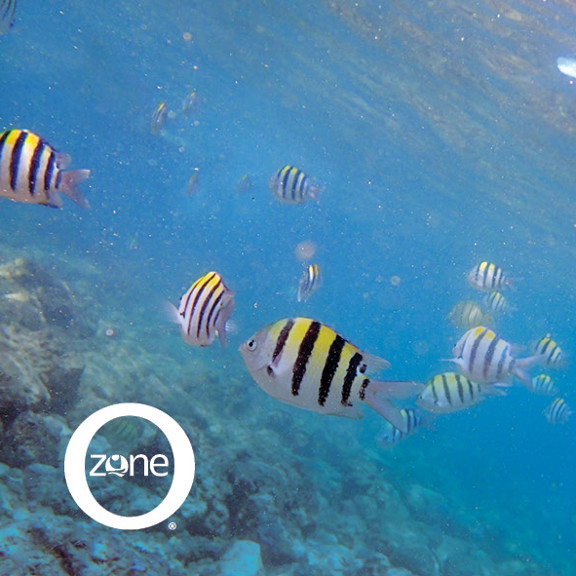Choisissez une langue

3Grands conseils pour être en sécurité sur les récifs *et* au soleil
Avez-vous entendu dire que de nombreuses crèmes solaires contiennent des produits chimiques nocifs pour nos précieux récifs coralliens ? C'est vrai. En fait, Hawaï est récemment devenu le premier État à interdire la distribution des produits chimiques oxybenzone et octinoxate sur son territoire.
Les récifs coralliens sont essentiels au maintien de la santé de l'écosystème complexe de nos océans et à la protection de nos côtes. Ils sont même une source de nouveaux médicaments pour traiter le cancer, les maladies cardiaques et d'autres affections. Ce ne sont là que quelques-unes des raisons pour lesquelles nous avons lancé OZONE (Outrigger's ZONE) à l'adresse 2014. Vous nous avez déjà entendus en parler. OZONE est notre initiative mondiale de conservation, qui vise à préserver nos récifs coralliens.
Nos récifs sont confrontés à de nombreux risques pour leur survie et, dans le même temps, les rayons ultraviolets (UV) constituent une véritable menace pour la santé du plus grand organe de notre corps : notre peau ! Alors, comment protéger à la fois les récifs coralliens et les prescriptions de notre médecin ?
Voici 3 des conseils importants pour protéger à la fois la santé de l'océan et celle de notre corps:
1. Porter des vêtements de protection. Lorsque nous sommes au soleil, il est important de couvrir notre visage et nos épaules, car ce sont souvent les parties les plus exposées au soleil. Les chapeaux à larges bords et les chemises à manches en tissu serré sont un bon point de départ. Lorsque vous nagez, portez une protection contre les érythèmes - des chemises conçues pour la natation. Et n'oubliez pas vos lunettes de soleil !
2. Restez à l'ombre - une bonne ombre. Les arbres dont la grande voûte cache la majeure partie du ciel, les parasols installés contre les bâtiments et les tentes de plage peuvent offrir une bonne protection contre le soleil. Si la lumière directe du soleil est la plus nocive, il est important de se rappeler que toutes les zones d'ombre ne sont pas égales. Les rayons UV ne se voient pas et ne se sentent pas, et ils peuvent se refléter sur l'eau, le sable, le béton et même l'herbe. Un bon moyen de savoir si vous êtes exposé à la lumière indirecte du soleil est de connaître la partie du ciel que vous pouvez voir - moins il y en a, plus vous êtes en sécurité. N'oubliez pas que les nuages diffusent les rayons UV, ils ne les arrêtent pas.
3. Utilisez une crème solaire adaptée aux récifs. Il s'agit d'écrans solaires minéraux qui réfléchissent les rayons du soleil à l'aide d'ingrédients tels que l'oxyde de zinc ou le dioxyde de titane. Ces types d'écrans n'absorbent pas la peau comme le font les écrans solaires chimiques. La plupart des pharmacies proposent de nombreux produits solaires qui ne contiennent pas les substances chimiques nocives que sont l'oxybenzone ou l'octinoxate (ou le méthoxycinnamate d'octyle). Vous pouvez également vous procurer une crème solaire sans danger pour les récifs dans votre hôtel Outrigger préféré. Comme de plus en plus de consommateurs font des choix respectueux des récifs, nous verrons de plus en plus d'options de crèmes solaires qui nous protègeront, nous et nos océans.